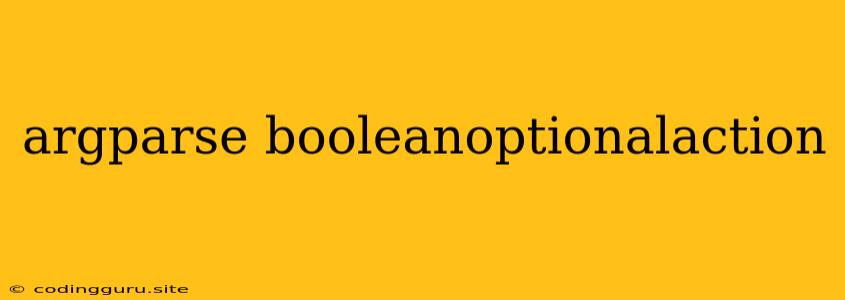Harnessing the Power of argparse.BooleanOptionalAction: Making Your Python Scripts More Flexible
When crafting Python scripts, handling command-line arguments is often a necessity. argparse is a powerful module that simplifies this process. But have you encountered scenarios where you need to optionally toggle a boolean flag, allowing the user to choose whether to activate a feature or not? This is where argparse.BooleanOptionalAction shines.
Understanding the Challenge
Let's imagine you're building a script that analyzes data. You want to give the user the option to include a specific filter, but by default, you want to run the analysis without the filter. Using the standard argparse.store_true or argparse.store_false actions might not be ideal.
Why argparse.BooleanOptionalAction is the Solution
argparse.BooleanOptionalAction provides a more elegant solution, addressing the following concerns:
-
Default Value Clarity: The action ensures that the boolean argument defaults to
Falsewhen not specified by the user. This avoids unexpected behavior if a missing flag is interpreted asTrue. -
Flexibility with User Input: The user can explicitly set the argument to
Trueusing the flag (-for--filter) or optionally activate the feature by passingTrueor1as the argument value. -
Boolean Control: The action gracefully handles boolean values, interpreting various forms of user input as
TrueorFalse(e.g.,--filter True,--filter 1,--filter).
Putting It into Practice
Let's illustrate how argparse.BooleanOptionalAction works with a concrete example.
import argparse
def main():
parser = argparse.ArgumentParser(description="Data analysis script.")
# Define the filter argument using BooleanOptionalAction
parser.add_argument(
'-f', '--filter',
action=argparse.BooleanOptionalAction,
default=False,
help="Apply a specific filter to the data."
)
args = parser.parse_args()
if args.filter:
print("Applying filter to the data.")
else:
print("Analyzing data without filter.")
if __name__ == '__main__':
main()
In this example:
-
We create an argument parser using
argparse.ArgumentParser(). -
We define an argument
-for--filterusing theargparse.BooleanOptionalActionclass. -
We set the
defaultvalue toFalse, ensuring the filter is not applied by default. -
The
helpmessage clarifies the argument's purpose to the user. -
parser.parse_args()collects the command-line arguments. -
We check the value of
args.filter. If it'sTrue(explicitly set by the user or inferred from the flag), the filter is applied; otherwise, data analysis proceeds without the filter.
Running the script:
-
No argument:
python data_analysis.pyOutput: "Analyzing data without filter."
-
Flag only:
python data_analysis.py -fOutput: "Applying filter to the data."
-
Value explicitly set:
python data_analysis.py --filter TrueOutput: "Applying filter to the data."
-
Value set with "1":
python data_analysis.py --filter 1Output: "Applying filter to the data."
Conclusion
argparse.BooleanOptionalAction provides a powerful and flexible way to handle optional boolean arguments in your Python scripts. By embracing this action, you can empower your users to tailor the behavior of your scripts with precision and clarity, leading to more robust and user-friendly applications.
